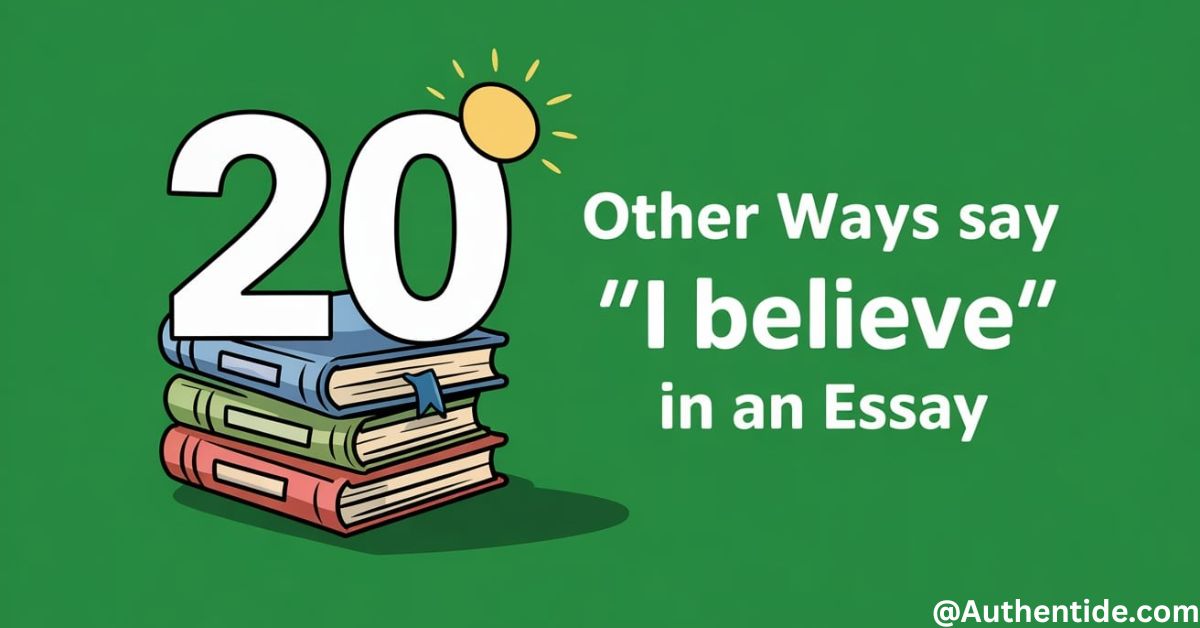Essay writing demands precision and sophistication, especially when expressing personal viewpoints. The phrase “I believe” appears frequently in student papers, yet it often weakens arguments through its conversational nature. Professional writers understand that elevating your language transforms ordinary essays into compelling academic discourse. While your personal perspective remains valuable, how you present it determines whether readers perceive your work as amateur or authoritative.
When crafting a persuasive or argumentative essay, the way you express opinion significantly impacts your credibility. Many students rely heavily on phrases like “I believe” or “I think,” not realizing these casual expressions can undermine otherwise strong analyses. By expanding your repertoire of alternative phrases, you’ll develop a more formal tone that commands respect in any academic setting.
This comprehensive guide explores twenty sophisticated alternatives to “I believe synonym” options that will elevate your writing instantly. We’ll examine practical applications across various contexts, from research papers to professional emails, so you can confidently articulate your personal conviction without reverting to overused expressions. Whether you’re a student striving for better grades or a professional refining communication skills, these alternatives will enhance your ability to construct a credible argument in any situation.
What to Say Instead of “I Believe”
- In my view
- I am convinced that
- I contend that
- It is my contention
- I assert that
- My perspective is
- It is my belief
- I maintain that
- I am of the opinion that
- From my standpoint
- Evidence suggests
- Research indicates
- It stands to reason
- One could argue
- The data demonstrates
- It appears that
- This suggests
- Analysis reveals
- It is reasonable to conclude
- All things considered
Why Finding Alternatives to “I Believe” Matters
In academic writing, precision and objectivity reign supreme. When you repeatedly use phrases like “I believe” or “I think,” you risk framing your arguments as merely personal opinions rather than well-researched conclusions. Sarah Jenkins, a writing professor at Cambridge University, explains: “The strongest academic essays don’t just present what the author believes; they present what the evidence demonstrates.”
Finding professional alternatives to everyday phrases distinguishes polished writing from casual communication. When you substitute “I believe” with more nuanced expressions, you immediately signal to readers that you’ve carefully considered your position. This subtle shift in language can transform how others perceive your intelligence and attention to detail, particularly in high-stakes scenarios like scholarship applications or professional proposals.
Additionally, expanding your vocabulary with formal phrases helps develop your unique voice as a writer. Rather than sounding like every other student who relies on “another word for ‘I believe’ in an essay,” you’ll cultivate a distinctive style that stands out to professors and potential employers alike. This versatility becomes especially valuable when transitioning between different types of writing, from persuasive essays to analytical reports.
Is It Professional to Say “I Believe”?
The appropriateness of saying “I believe” depends entirely on context. In casual emails or personal reflections, this phrase works perfectly fine. However, in formal writing contexts like research papers, business proposals, or academic settings, it often projects uncertainty rather than confidence.
Professor Thomas Miller, who teaches Advanced Composition at Yale, notes: “When students write ‘I believe,’ they’re often unconsciously hedging. The phrase creates distance between the writer and their claims, suggesting they aren’t fully committed.” Professional writing typically aims to present ideas with authority, backed by evidence rather than personal belief systems.
That’s not to say personal perspective has no place in professional writing. In fact, many disciplines—particularly humanities subjects like literature and philosophy—value informed personal interpretation. The key distinction lies in how to say I believe in an essay without diminishing your authority. By replacing “I believe” with more sophisticated alternatives, you maintain your voice while elevating your tone to match professional standards.
20 Other Ways to Say “I Believe” in an Essay
Here are 20 Other Ways to Say “I Believe” in an Essay:
1. In my view

This phrase acknowledges your personal perspective while maintaining a professional tone. It works especially well when comparing multiple viewpoints.
Example scenario (Academic paper): “Various economists have analyzed the market crash differently. In my view, the data most strongly supports Keynes’ interpretation of cyclical downturns, especially when examining the recovery patterns.”
2. I am convinced that
This alternative conveys stronger conviction than “I believe,” suggesting you’ve carefully considered evidence before forming your conclusion.
Example scenario (Business proposal): “After analyzing three years of customer feedback and sales data, I am convinced that our company should pivot toward subscription-based services rather than one-time purchases.”
3. I contend that
Used frequently in debate and legal writing, this phrase signals that you’re making a reasoned argument, not merely stating an opinion.
Example scenario (Political science essay): “I contend that voter identification laws, when implemented without adequate accessibility provisions, disproportionately affect marginalized communities, as evidenced by participation statistics from the past three elections.”
4. It is my contention
This slightly more formal version of “I contend” creates distance between you and your argument, making it seem more objective.
Example scenario (Literature analysis): “It is my contention that Fitzgerald’s use of color symbolism throughout The Great Gatsby serves primarily to highlight class distinctions rather than emotional states, contrary to common interpretations.”
5. I assert that
When you need to make a bold claim with confidence, this phrase works exceptionally well. It positions you as an authority making a definitive statement.
Example scenario (Legal brief): “I assert that the precedent established in Brown v. Board applies directly to the current case, despite the defendant’s attempts to distinguish the circumstances.”
6. My perspective is

This thoughtful alternative acknowledges subjectivity while maintaining professionalism. It works well when multiple valid interpretations exist.
Example scenario (Art criticism): “My perspective is that Picasso’s later works reveal not a decline in skill, as some critics suggest, but rather a deliberate rejection of conventional aesthetic values in favor of emotional expressiveness.”
7. It is my belief
Though similar to “I believe,” this phrasing sounds more formal and deliberate, making it suitable for academic writing.
Example scenario (Philosophy paper): “It is my belief that consciousness emerges from physical processes yet cannot be reduced entirely to them, positioning this view between strict dualism and eliminative materialism.”
8. I maintain that
This phrase suggests you’re defending a position against potential objections, making it perfect for argumentative writing.
Example scenario (Environmental policy paper): “I maintain that carbon taxation alone, without complementary investment incentives, cannot achieve the emissions reductions necessary to meet international climate agreements.”
9. I am of the opinion that
More formal than simply saying “I believe,” this phrase works well in professional correspondence and academic writing.
Example scenario (Email to colleague): “After reviewing the quarterly reports, I am of the opinion that we should delay the product launch until market conditions improve. The attached analysis supports this recommendation.”
10. From my standpoint
This phrase emphasizes that you’re speaking from a particular position or perspective, acknowledging that others might see things differently.
Example scenario (Sociology research): “From my standpoint as both a researcher and community member, the survey results reveal not just statistical trends but meaningful patterns of social cohesion that quantitative methods alone might miss.”
11. Evidence suggests
This phrase shifts focus from your personal belief to the evidence itself, creating a more objective tone perfect for scientific or research-based writing.
Example scenario (Scientific paper): “Evidence suggests that intermittent fasting affects metabolic pathways differently depending on an individual’s baseline insulin sensitivity, contradicting earlier one-size-fits-all approaches.”
12. Research indicates

Similar to “evidence suggests,” this alternative creates distance between your personal opinions and research findings, lending credibility to your argument.
Example scenario (Psychology essay): “Research indicates that early childhood trauma significantly alters brain development, particularly in regions associated with emotional regulation and stress response.”
13. It stands to reason
This phrase introduces logical conclusions without expressly attributing them to your personal belief system.
Example scenario (Economics analysis): “Given the historical correlation between interest rates and housing starts, it stands to reason that the recent policy shifts will dampen new construction for at least two quarters.”
14. One could argue
This thoughtful alternative introduces your perspective while acknowledging it as one of several possible interpretations.
Example scenario (Film analysis): “One could argue that Nolan’s non-linear storytelling serves not merely as a stylistic choice but as a thematic reinforcement of his characters’ fragmented experiences of time and memory.”
15. The data demonstrates
For quantitative arguments, this phrase shifts attention to objective information rather than personal interpretation.
Example scenario (Marketing report): “The data demonstrates a clear correlation between our social media engagement metrics and conversion rates, particularly among the 18-24 demographic.”
16. It appears that

This slightly cautious phrase works well when you’re drawing conclusions from limited or preliminary evidence.
Example scenario (Medical research): “It appears that the experimental treatment affects tumor size more significantly in patients with the specific genetic marker, though larger trials are needed to confirm this finding.”
17. This suggests
Concise and direct, this phrase connects evidence to conclusions without unnecessarily inserting yourself into the sentence.
Example scenario (Historical analysis): “The sharp increase in pamphlet publication following the speech suggests that public opinion shifted dramatically in response to the event, contrary to official accounts of the period.”
18. Analysis reveals
This alternative focuses attention on your analytical process rather than personal opinion, lending credibility to academic or scientific writing.
Example scenario (Data science report): “Analysis reveals patterns of user behavior that contradict our initial hypotheses about feature adoption rates.”
19. It is reasonable to conclude
This measured phrase signals careful consideration while still conveying confidence in your conclusion.
Example scenario (Legal argument): “Given the plaintiff’s documented history and the timing of events, it is reasonable to conclude that the actions constituted awareness of potential harm, meeting the standard for negligence.”
20. All things considered

This thoughtful transition signals that you’ve weighed multiple factors before reaching your conclusion.
Example scenario (Policy recommendation): “All things considered, implementing the graduated tax structure would generate sufficient revenue while minimizing impact on small businesses, making it the most balanced approach among the proposals.”
How to Choose the Right Alternative
Selecting the appropriate alternative to “I believe” depends on several factors, including your writing context, audience expectations, and the strength of your evidence. Academic settings generally reward more formal alternatives like “evidence suggests” or “research indicates” that shift focus from personal belief to objective analysis.
Consider your credible argument needs when choosing. Are you making a bold claim requiring strong language like “I assert” or “I contend”? Or are you offering one interpretation among many, better suited to phrases like “one could argue” or “from my standpoint”? The confidence level implicit in your chosen phrase should match the strength of your supporting evidence.
Dr. Amanda Carter, who teaches composition skills at Oxford, recommends: “Try reading your sentence aloud with different alternatives to ‘I believe.’ The one that sounds most natural while maintaining your intended tone is usually your best choice.” This simple exercise helps writers develop intuition about which alternative phrases fit their particular writing style and purpose.
When to Maintain First-Person Perspective
Despite the alternatives provided, sometimes retaining first-person perspective serves your writing purpose better than avoiding it. Personal narratives, reflection essays, and opinion pieces often benefit from judicious use of “I” statements that establish your authentic voice.
Even in formal writing, occasionally using “I” can add clarity when distinguishing your original ideas from those you’re summarizing. As Professor James Rodriguez notes: “The blanket prohibition against first-person pronouns in academic writing has softened considerably. What matters is using them purposefully rather than habitually.”
The key distinction lies in frequency and function. Using “I believe” sparingly to introduce a genuinely personal insight differs dramatically from repeatedly using it as a verbal tic throughout your writing. When you do choose first-person constructions, ensure they serve a specific rhetorical purpose rather than functioning as filler phrases.
Frequently Asked Question
What’s another way to say “I believe”?
Another way to say “I believe” is “In my opinion.”
How do you say “I believe you” in different ways?
- I trust you.
- I have faith in you.
- I’m convinced.
- That makes sense to me.
- I don’t doubt you.
- I’m with you on this.
- You’ve got me convinced.
- I accept what you’re saying.
- Sounds credible to me.
- I’m on your side.
How do you start a sentence instead of I believe?
- It seems that…
- There is reason to think…
- Evidence suggests that…
- One could argue that…
- It is clear that…
- From my perspective…
- Research indicates that…
- In my view…
- It is widely accepted that…
- Some may contend that…
How do I replace in my opinion?
- From my perspective
- As I see it
- To me
- I think that
- In my view
- It seems to me that
- I would argue that
- Personally, I believe
- My take is that
- I hold the view that
Final Thoughts
Mastering alternative phrases to “I believe” represents just one aspect of developing sophisticated essay writing skills. The goal isn’t merely to avoid certain words but to express your personal perspective with precision and authority appropriate to your context.
Remember that effective writing balances objectivity with authentic voice. While these alternatives help you maintain a formal tone when needed, they shouldn’t make your writing sterile or disconnected from your genuine insights. The most compelling academic essays combine rigorous thinking with the writer’s distinctive viewpoint, expressed through carefully chosen language.
As you practice incorporating these alternatives into your writing, you’ll develop intuition about which phrases best serve your particular arguments. This expanded vocabulary for expressing opinion becomes another tool in your writing arsenal, allowing you to craft nuanced, persuasive, and professional communication across various contexts.
By thoughtfully considering how to say I believe in an essay without actually using that phrase, you’ll elevate not just your language but your thinking process. The effort to find precise alternatives often clarifies your own understanding of just how strongly you hold a particular view and what evidence supports it—making you not just a better writer, but a more rigorous thinker as well.

Your go-to place for smart synonyms and celebrity updates. Muhammad Hassan Abid is dedicated to creating useful, engaging content that informs, inspires, and truly serves your curiosity

